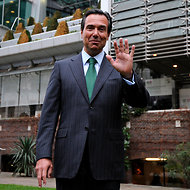 Carl Court/Agence France-Presse — Getty ImagesAntónio Horta-Osório, chief of Lloyds Banking Group, returned to work on Monday at the company’s London headquarters.
Carl Court/Agence France-Presse — Getty ImagesAntónio Horta-Osório, chief of Lloyds Banking Group, returned to work on Monday at the company’s London headquarters.
LONDON – The chief executive of Lloyds Banking Group, António Horta-Osório, decided Friday to give up his bonus for last year after taking a leave of absence from the struggling financial firm.
Lloyds, which is partly owned by the government, said Mr. Horta-Osório told the bank’s board that he did not wish to be considered for an annual bonus for 2011. Mr. Horta-Osório was in line for a bonus of as much as £2.4 million, or $3.7 million. The board accepted the request, Lloyds said in a statement.
“As chief executive, I believe my bonus entitlement should reflect the performance of the group but also the tough financial circumstances that many people are facing,” Mr. Horta-Osório said. “I also acknowledge that my leave of absence has had an impact both inside and outside the bank including for shareholders. On that basis, I have decided to request that the board does not consider me for a 2011 bonus.”
Mr. Horta-Osório resumed running Lloyds this month after taking a two-month medical leave for exhaustion at the end of last year. Lloyd’s board had consulted doctors, investors and the British government — which remains a shareholder in the bank — before allowing Mr. Horta-Osório to return to his post.
Mr. Horta-Osório said he was so consumed by turning around the ailing British bank that he had trouble sleeping. Since joining Lloyds in March last year, Mr. Horta-Osório cut some middle management and worked on improving customer service at branches.
Lloyds reported a third-quarter loss in November and said that it might miss some financial targets because of the difficult economic environment.
Article source: http://feeds.nytimes.com/click.phdo?i=35a53418a6bdc1bd3b0696b4b7234eb9